Answering the Call
Jeff Heidelbauer has given a lifetime of service to DU’s conservation mission and inspired many others to follow the same path
Jeff Heidelbauer has given a lifetime of service to DU’s conservation mission and inspired many others to follow the same path
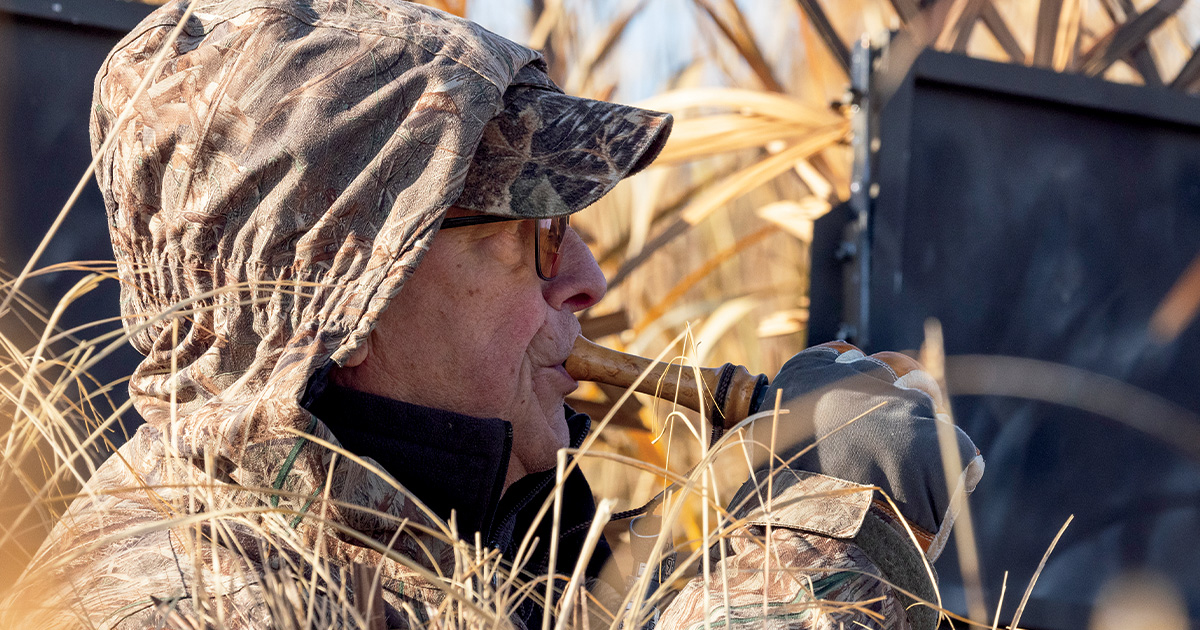
The wind always blows in South Dakota—that is, until it doesn’t. On this hunt we are enduring the exception rather than the rule. Such are the whims of Mother Nature on the Great Plains. The first mallards of the morning behave as mallards do when there is no wind to keep them honest. This makes for some comedic play-by-play between Jeff Heidelbauer, who is in the bow of our duck boat; me, in the stern; and Terry Kostinec, who is sandwiched between us.
“Mallards. Left side. Left side. Now they’re in back.”
“Don’t move. They’re working right behind the boat.”
“On the right. Nope, behind us again. Now on the left.”
“Oh, where are they going? Back behind?”
“Left again.”
“Right.”
“Where?”
“C’mon!”
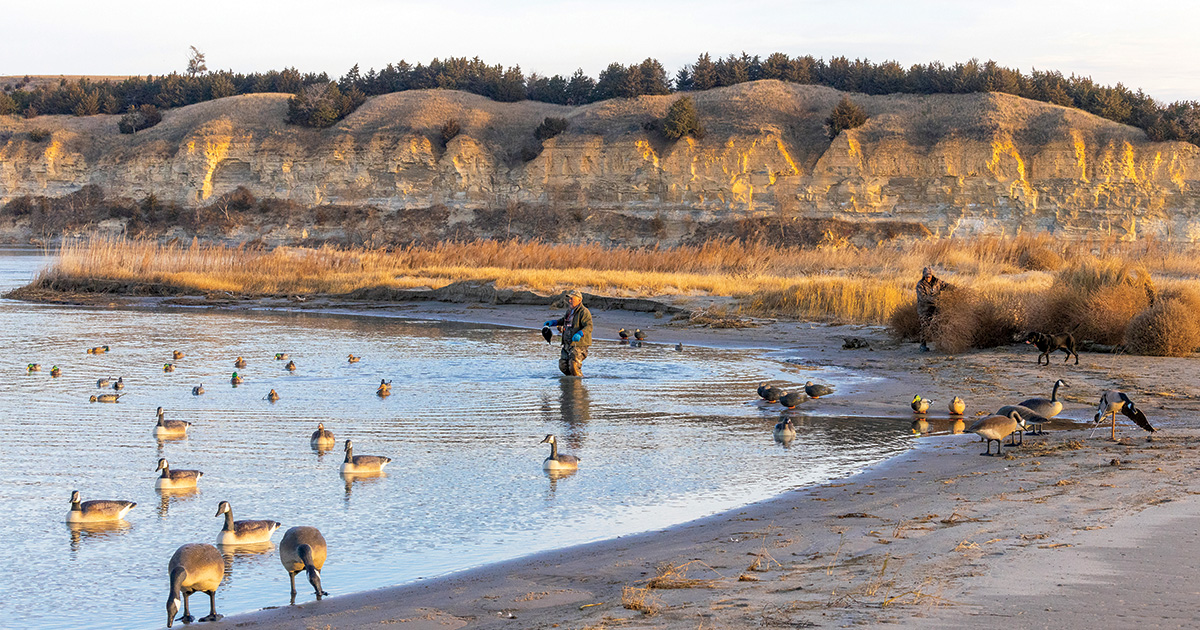
Setting the spread in sheltered backwater.
Eventually the greenheads disappear somewhere over the marsh. Terry grabs his thermos and pours me a coffee, and Jeff provides his first nugget of wisdom of the morning.
“I think there is really only one time that the wind doesn’t blow in South Dakota,” he says, “and that’s when there is a decoy on the water.”
At present, it is hard to argue with the guy.
Despite the lack of weather, this hunt along the Missouri River is a celebration of sorts for my hosts. Jeff is a longtime DU volunteer leader, while Terry is DU’s senior director of development in the Great Plains Region. A recent tribute event raised more than $1 million in recognition of the 80 years of combined service that Jeff and his wife, Dr. Rebecca McGee, have contributed to wetlands and waterfowl conservation. You would think that such dedication to conserving the outdoors would have earned us at least enough breeze to put some motion in the decoys and help center birds that are working the spread, right?
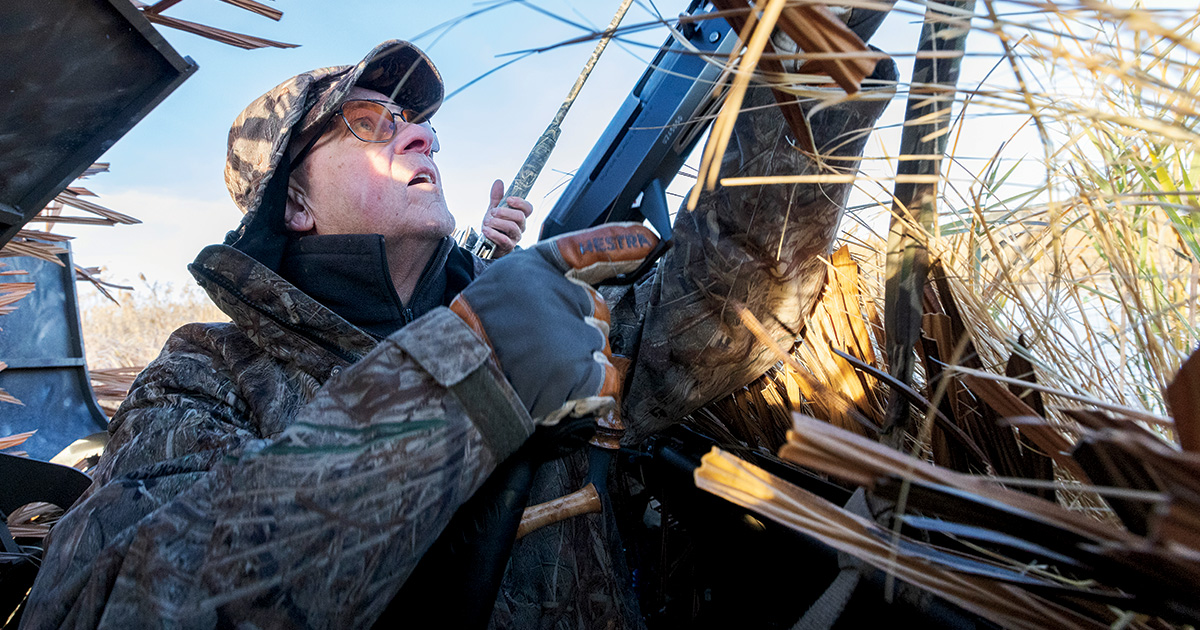
Heidelbauer takes a shot.
Jeff Heidelbauer is a product of the Midwest, and his education in the outdoors began in the Iowa countryside. On Jeff’s eighth birthday, his father handed him a lean little Winchester single-shot—no frills, just wood and steel and promise in the hands of a budding outdoorsman. That fall, he shot his first duck—a drake green-winged teal—and the embers of a lifelong passion were lit. A duck hunter was born.
The apple didn’t fall far from the tree. His father, Frank—or Frankie, as he was affectionately known to his friends—was an avid duck hunter and a legendary DU volunteer in his own right. A decorated World War II veteran, Frank flew 305 missions over “the hump” in the Himalayan Mountains while supporting Allied forces. He later served as a pilot for the Iowa Conservation Commission, but in waterfowl hunting circles he is probably best known for his handcrafted duck and goose calls, which bear the family name. Frank began designing and crafting duck calls in the late 1940s, and in 1952 he began selling his calls. The first call he sold was known as the Mallard Toller. The goose call that Jeff uses in the field to this day is one that his father made in 1957. Today, Jeff’s son, Todd, continues the family legacy of call making, and the Mallard Toller will celebrate its 75th anniversary in 2027.
When Jeff was 11, his family moved from Iowa to South Dakota, where his love of waterfowl and waterfowl hunting continued to grow. “I thought I had died and gone to heaven,” Jeff recalls. He spent countless mornings in the marsh hunting ducks and geese with his dad, and among the lessons that his father shared with him was the importance of giving back.
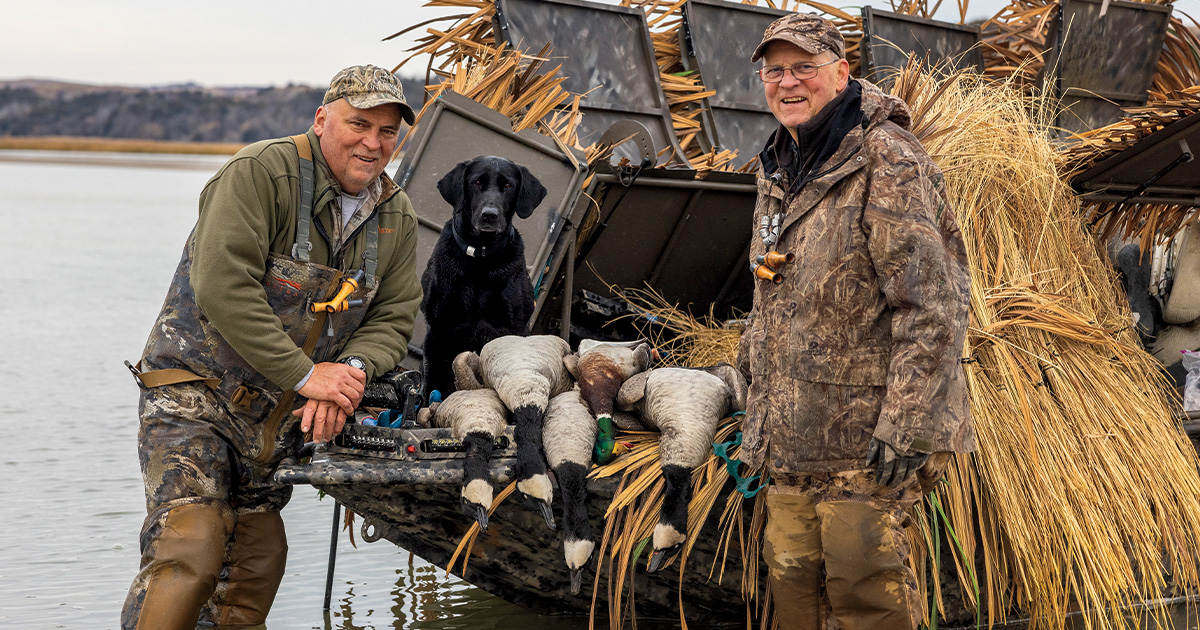
Kostinec and Heidelbauer after the morning's hunt.
“I remember the exact moment he told me that he donated the cost of a box of shotgun shells to Ducks Unlimited each year. A box of shells didn’t cost much back then, but he didn’t make a lot of money, either,” Jeff recalls. “It was the first time that I had heard of Ducks Unlimited and this idea of giving back to something that is so important. I decided then and there that I would give back too.”
Jeff began his journey as a DU volunteer in 1975, when he was recruited to help launch a new DU chapter in Le Sueur, Minnesota, shortly after he earned a graduate degree in microbiology and chemistry from South Dakota State University. Over the next three decades, he would serve as area chair, zone chair, and district chair. When he retired and returned to South Dakota, he became area chair for the Custer DU chapter, a title that he still holds today. He served a three-year stint as South Dakota state chair before going on to serve for more than a decade on DU’s board of directors. He currently has a seat on the board of directors of Ducks Unlimited de México and will soon take a position on the DU Canada board.
In addition to his personal involvement with DU, Jeff’s impact has been multiplied many times over by the legions of volunteers he has personally recruited into DU’s ranks. It is said that an invitation to join Jeff at a DU dinner usually ends with a polite call to action, maybe something along the lines of “You know, have you ever considered heading up the state DU newsletter? I think you’d be great at it.” (Over a decade later, I’m still at it.)
Jeff’s many personal relationships with other members of the DU family—people from all walks of life who share a passion for wetlands and waterfowl and a wish to give something back—have fueled his participation in the organization for 50 years. “You join DU because of the cause, and you stick around because of the people,” he says. “It’s that simple. DU is what it has become because it is driven by volunteers, people united by a cause that is so near to their hearts. When you turn that passion into action, great things can be accomplished.”
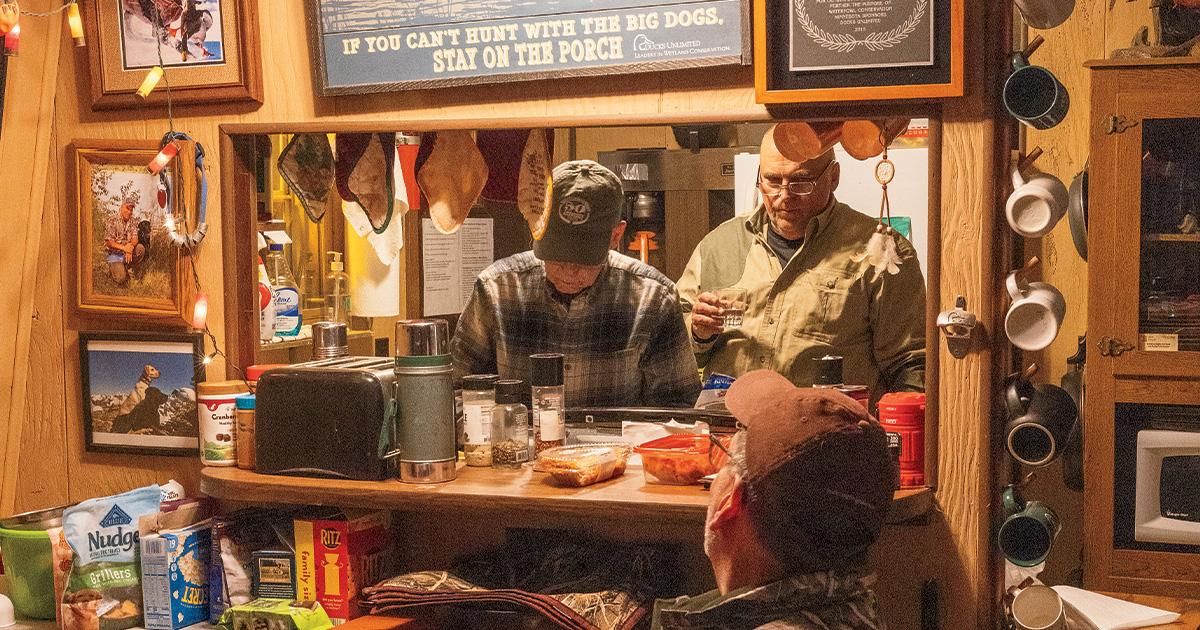
Kicking back at camp after the hunt.
Those who participated in the Heidelbauer tribute event were asked to become Grand Slam Life Sponsors, a giving level that supports DU’s conservation work in the United States, Canada, and Mexico. They quickly met and surpassed the initial goal of $350,000, and when the final figures were tallied, more than $1.2 million had been raised in honor of Jeff and Rebecca, with the funds going to support DU conservation efforts in all three countries. Like most private contributions to DU, the dollars donated in their honor helped leverage additional funding from the North American Wetlands Conservation Act and other programs, dramatically expanding the impact of those initial gifts. The tribute’s success speaks volumes about the influence that Jeff has had on others within DU. When you speak to those in his wide circle of friends, they are quick to praise him for his passion, for being on the forefront of volunteer leadership, and for always asking questions that help drive a conversation toward action for conservation.
The wind never materializes on our hunt along the Missouri, but we manage to add a few birds to the bag, alms to a trio of hunters who have been begging for a breeze. Even in these calm conditions, the signs of a migration appear above us—skeins of snow geese sail overhead against the big South Dakota sky; the rolling, throaty calls of sandhill cranes drift down from on high; and a small group of whooping cranes makes an appearance before settling somewhere on the braided ribbons of moving water meandering through the marsh.
Not long ago, the mere presence of whooping cranes could have resulted in the closure of hunting on this stretch of river. Now, we marvel at the sight of these majestic birds and note their location so we can avoid disturbing them on our trip back to the boat ramp. While still threatened, the whooping crane population is now increasing thanks to the efforts of many passionate conservationists who have come before us.
The quiet stillness of the morning is interrupted by a pair of Canada geese honking loudly as they wing their way downriver. Naturally, Jeff lifts his father’s call to his lips. Hrrr-ronk, hrrr-ronk, hrr-ronk!
The sound booms over the marsh, an invitation to the geese to come join us. There is no reaction at first, but as the sound reaches the birds, they suddenly change course and head in our direction. Like so many DU supporters who have been moved by Jeff’s words over the years, they are answering the call.
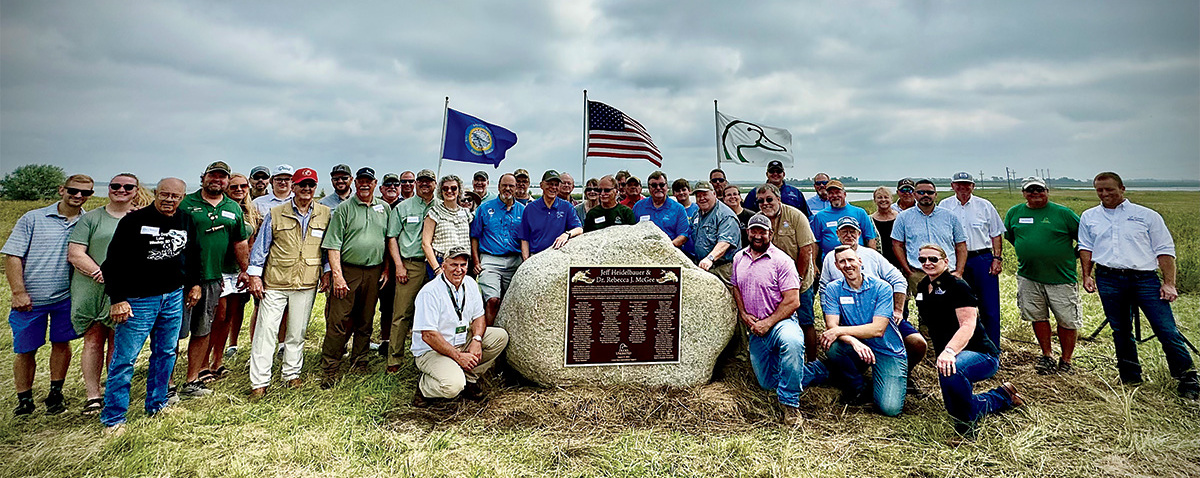
DU supporters gathered in South Dakota to honor Jeff Heidelbauer and his wife, Dr. Rebecca McGee.
On a windswept August day in east-central South Dakota, dozens of DU supporters—members, donors, volunteers, and partners—gathered on a hill overlooking a beautiful expanse of native prairie to celebrate the conservation leadership of Jeff Heidelbauer and his wife, Dr. Rebecca McGee. In the background, the blue waters of a wetland complex sparkled in the sunlight as the wind buffeted the flags framing the ceremony. It was the first of three DU project dedications that would be held to recognize Jeff and Rebecca as well as those who pledged gifts in their honor. Another tribute event followed that fall at Ducks Unlimited Canada’s Nevdoff project in Saskatchewan. The third tribute event was held at Ducks Unlimited de México’s John E. Walker Research and Training Center at Celestún on the Yucatán Peninsula.
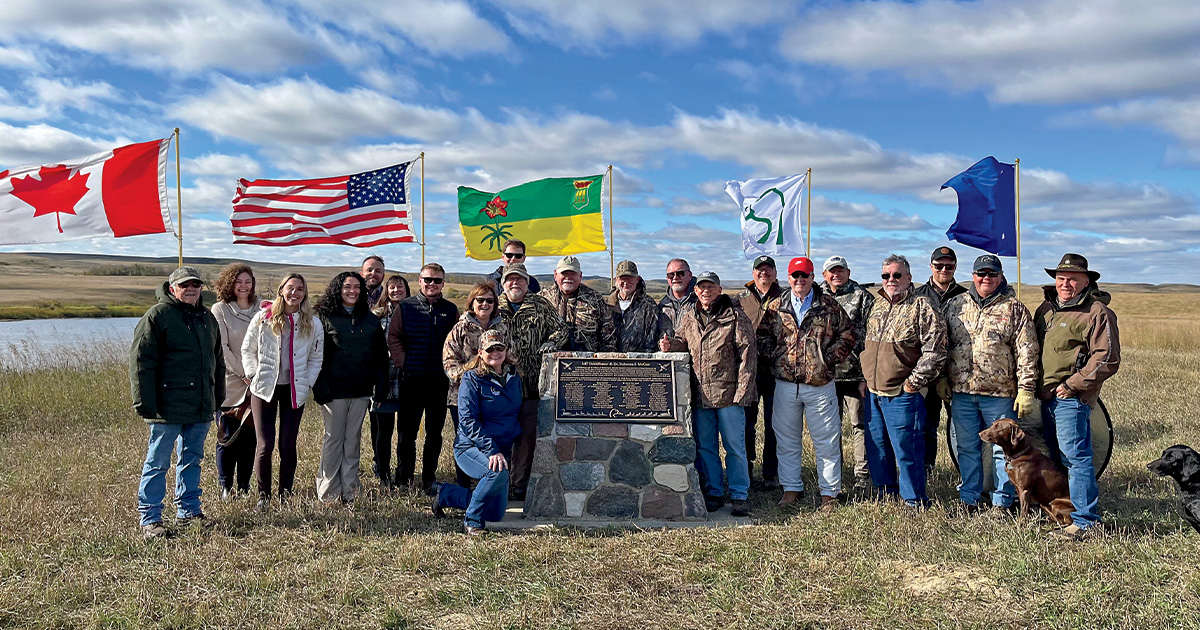
Additional dedications followed at DU Canada’s Nevdoff project in Saskatchewan (above) and DU de México’s John E. Walker Research and Training Center in Celestún.
The continental scope of the dedications held in Jeff and Rebecca’s honor was no accident. “When we first discussed the idea of a tribute event, Jeff asked that it be an international effort,” says Cynthia Edwards, DU managing director of donor engagement. “Jeff will tell you that ducks know no boundaries.”
In addition to supporting on-the-ground conservation work, Jeff and Rebecca share a deep-rooted commitment to the science that has long guided DU’s efforts across the flyways. True to that spirit, they played a pivotal role in establishing an endowed chair in wetland and waterfowl conservation at the University of Saskatchewan, the first such position established in Canada. The current chair, Dr. Mitch Weegman, provides instruction and mentoring to future scientists, conservationists, and wildlife managers and leads important research on key issues facing North America’s wetlands and waterfowl. Before the Nevdoff dedication last fall, students from the University of Saskatchewan met with Jeff and Rebecca to share information about their ongoing research projects.
Ducks Unlimited uses cookies to enhance your browsing experience, optimize site functionality, analyze traffic, and deliver personalized advertising through third parties. By continuing to use this site, you agree to our use of cookies. View Privacy Policy